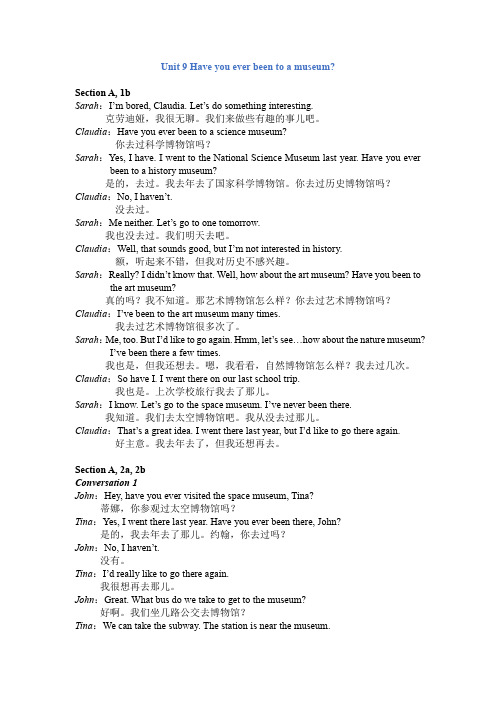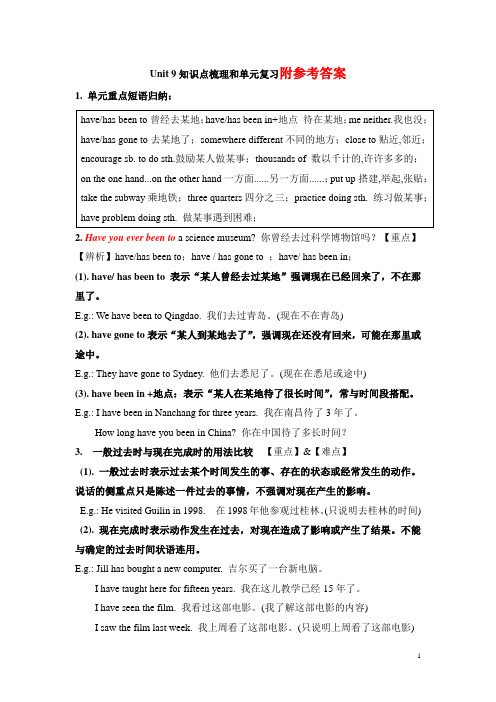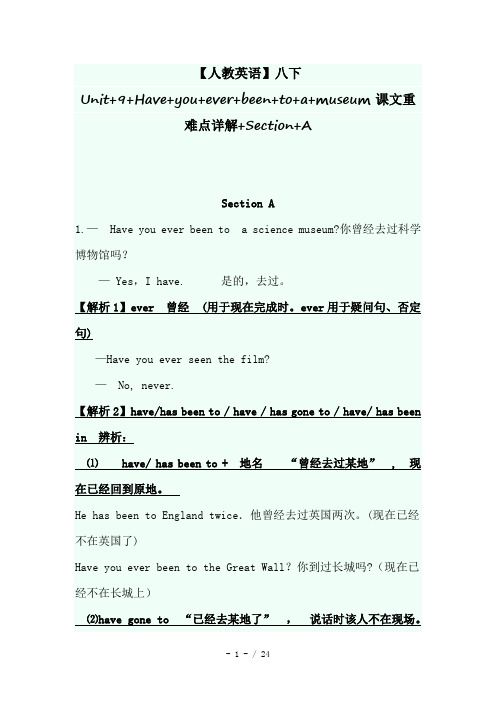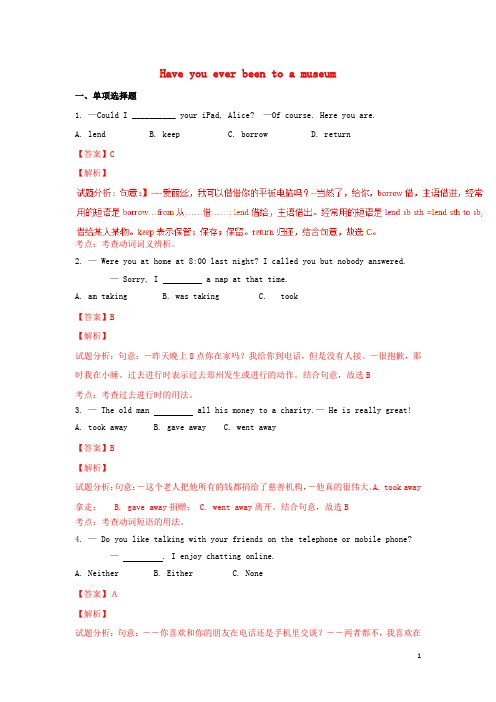八年级英语下册 Unit 9 Have you ever been to a museum Section B 3a教案 (新版)人教新目标板
人教新目标英语八年级下册讲义—Unit 9 Have you ever been to a ……

新目标八年级下册Unit 9 Have you ever been to a museum ?讲义一、重点单词1. amusement n. 娱乐; 游戏2. somewhere adv. 在某处; 到某处3. camera n. 照相机; 摄影机; 摄像机4. invention n. 发明物5. invent v. 发明; 创造1. unbelievable adj. 难以置信的; 不真实的2. progress n. 进步; 进展3. rapid adj. 迅速的; 快速的4. unusual adj. 特别的; 不寻常的5. toilet n. 坐便器; 厕所6. encourage v. 鼓励7. social adj. 社会的8. peaceful adj. 和平的; 安宁的9. performance n. 表演; 演出10. perfect adj. 完美的; 完全的11. itself pron.(it的反身代词) 它自己12. collect v. 收集; 采集13. German adj. 德国的; 德语的; 德国人的n. 德语; 德国人14. theme n. 主题15. ride n. 供乘骑的游乐设施; 短途旅程16. province n. 省份17. simply adv. 仅仅; 只; 不过18. fear v. & n. 害怕; 惧怕19. whether conj. 不管......;还是); 或者......(或者); 是否20. Indian adj.印度的 n. 印度人21. Japanese adj.;日本的; 日本人的; 日语的n. 日本人; 日语22. equator n. 赤道23. whenever conj. 在任何......时候; 无论何时24. spring n. 春天25. mostly adv. 主要地; 通常26. location n. 地点; 位置二、短语归纳1.at night在夜晚2.in a more natural environment在一个更加自然的环境中3.all year round 全年4.be far from 离……远5.in the dark 在黑暗中6.in the past 在过去7.have been to sp. 去过某地8.science museum 科学博物馆9.history museum 历史博物馆10.amusement park 游乐园11.go somewhere different 去不同的地方12.go skating 去滑冰13.take the subway 坐地铁14.a great way to spend a Saturday afternoon一个过周六下午的好方法15.all the old movie cameras所有的古老的电影摄影机16.learn about sth.解有关……的情况17.on the weekend 在周末18.camp in the mountains 在大山里露营19.put up a tent搭帐篷20.in such a rapid way 以如此迅猛的方式21.different kinds of各种各样的22.development of toilets 厕所的发展23.social groups 社会团体24.the tea art performances茶艺表演25.make a perfect cup of tea with beautiful tea sets用漂亮的茶具沏一杯完美的茶26.a nice place to enjoy tea 一个品茶的好地方27.thousands of 数以千计的28.International Museum of Toilets国际厕所博物馆29.the Terracotta Army 兵马俑30.Southeast Asia东南亚31.Night Safari 夜间动物园32.three quarters 四分之三33.an English-speaking country一个讲英语的国家34.have problem doing sth. 做某事很困难35.during the daytime在白天36.a couple of times 好几次37.right now 现在;目前38.an amusement park with a special theme一个有特别的主题的游乐园39.walk around the park 在公园里到处走40.hear of 听说41.take a ride兜风42.another province另一个省43.the Bird’s Nest鸟巢44.encourage sb. to do sth.鼓励某人做某事45.on the one hand... on the other hand.一方面,另一方面三、句型集萃1.a great way to do sth一个做某事的好办法2.It’s unbelievable that很难相信……3.watch sb do sth.看某人做了某事4.encourage sb to do sth鼓励某人做某事5.as..as和。
新课标人教版八年级英语下册Unit 9 Have you ever been to an amuse

—So did Tina.
中国地图
蒂娜也去了。
—He has been a soldier for two years.
要点点拨
他已经当了两年兵了。
go inline skating 滑旱冰
—So have I.
我也是。
全析提示
3.Look at the map of the town.Listen and circle the places 助动词 have 和 has 可以与前面的
you hear.
主语缩略’ve 和’s。
看城镇的地图。听录音并圈出你听到的地方。
如:we’ve,they’ve,he’s,
water world 水上世界
it’s 等。
city library 城市图书馆
have not 常缩略为 haven’t,has
fun times amusement park
如果说“欢迎回家”该怎么说呢?
把 1a 中你的回答和你搭档的回答对照一下。
Wele back home!
4.For me,“I have to!” is number two.
对我来说“I have to!”是第二位的。
要点点拨
5.Listen to a teacher interview a student.Circle the newsletter 业务通讯;新闻信札
route“路线、小路、小巷”,使
The main attraction was a Charlie Chaplin film.
用 X 围也较小。course 表示船的
吸引人的主要是查理·卓别林的电影。
“航道”或飞机的“航线”。
The idea of being a teacher has little attraction to young
八年级英语下册Unit9Haveyoueverbeentoanamusementpark哈利波特主题公园开门迎客英语新闻文章素材人教新目

八年级英语下册《Unit 9 Have you ever been to an amusement park 哈利波特主题公园开门迎客英语新闻》文章素材“Harry Potter” star Daniel Radcliffe led groups of excited kids dress ed in Hogwarts uniforms as the Wizarding World of Harry Potter theme park officially opened on Friday to long lines and sna rled traffic.哈利波特魔法世界主题公园于上周五正式开放,开放日当天公园门口排起长队,被堵得水泄不通。
《哈利波特》系列电影的主演丹尼尔雷德克里夫则带领着一群兴高采烈、身穿霍格沃茨魔法学校校服的孩子们畅游乐园。
Radcliffe, Rupert Grint who plays the boy wizard's best friend Ron Weasley, and other actors from the blockbuster movie and book series, were on hand at Universal Orlando as fans lined up more than eight hours to be among the first visitors.当天,雷德克里夫和《哈利波特》系列电影和小说中哈利波特的好友罗恩韦斯莱的扮演者鲁伯特格林特及其它主创都现身奥兰多环球影城,而“哈迷”们则为了成为公园的第一批游客不惜排队等待八个多小时。
Before dawn, the backup of Potter fans began to block the main highway through Orlando near the entrances to Universal, prompting the theme park to open its parking garage at 5 am -- 30 minutes earlier than planned, according to local media.据当地媒体报道,当天天亮之前,环球影城入口附近的市内主要通道已开始被“哈迷”们堵塞,使得主题公园不得不提前30分钟,于凌晨5点就开放了停车场。
郑州市八年级英语下册Unit9Haveyoueverbeentoamuseum必考知识点归纳

郑州市八年级英语下册Unit9Haveyoueverbeentoamuseum必考知识点归纳单选题1、We _______ Beijing many times, so we know it very well.A.have been inB.went toC.have been toD.have gone to答案:C句意:我们去过北京很多次,所以对北京很了解。
考查动词时态。
have been in在某地,表示状态;went to一般过去时态;have been to去过某地,已回来;have gone to去了某地,还未回来。
根据“We...Beijing many times, so we know it very well”可知,应该是去过某地,故选C。
2、David broke Lucy’s computer, but he managed to repair it by ________. A.itselfB.myselfC.herselfD.himself答案:D句意:他弄坏了露西的电脑,但他设法自己把它修好了。
考查反身代词。
itself它自己;myself我自己;herself她自己;himself他自己。
根据固定搭配“by oneslf”可知,此空用反身代词;主语是“he”,因此用反身代词“himself”。
故选D。
3、—________ you are rich or poor, you should study hard.—Y ou’re right. ________ I work harder, I will have a better future.A.If; WhetherB.Whether; IfC.If; IfD.Whether; Unless答案:B句意:——无论你是富有还是贫穷,你都应该努力学习。
——你说得对。
如果我更加努力,我会有一个更好的未来。
考查连词辨析。
新目标英语八年级下册Unit 9 Have you ever been to an amusement park讲解与练习

第 1 页 (共4 页) 第 2 页 (共4 页)学校 姓名 班级 考场 考号---------------------------------○密------------------ -------------------○封----------------------------- -- --○线----------------------------※※※※※※※※※※※※※※※答※※※※※※※※※※※※※※※※※※题※※※※※※※※※※※※※※※※线※※※※※※※※※※※※※新目标英语八年级下册Unit 9 Have you ever been to an amusement park?讲解与练习重要短语1. have been to 到过某处2. an amusement park 游乐园3. a water park 水上公园4. a roller coaster 过山车5. see sb. doing sth. 看见某人正在做某事 see sb. do sth. 看见某人做了某事6. walk around 四处走动7. take a ride 兜风 8. on board 在船上 9. take different routes 走不同的路线 10. end up 结束 11. argue with sb. 与某人争吵 12. an English-speaking country 说英语的国家 13. an exchange student 交换生 14. a flight attendant 一名机组乘务员 15. a tour guide 导游 16. such as 例如 17. listening skills 听力技能 18. in Southeast Asia 在东南亚 19. take a holiday 度假 20. three quarters 四分之三 21. have problems (in) doing sth. 做某事很费劲 22. during the daytime = in the day 在白天 23. all year round 全年,一年到头 24. wake up 醒来,唤醒,叫醒 句子讲解1.Have you ever been to an amusement park?你曾到过游乐场吗?(1)amusement park 游乐场,游乐园 (2)本句用现在完成时表示过去发生的事情对现在造成的影响或结果。
人教版英语八下U9Have you ever been to a museum 讲义

Unit9 Have you ever been to a museum?一、重点词汇及拓展1. amusement n. 娱乐;游戏e.g. The old ladies played the games just for amusement.老太太们玩这个游戏只是为了取乐。
amuse v. 消遣,逗笑;使开心,使愉快amusing adj. 有趣的,好玩的,好笑的amused adj. 被逗乐的;感到好笑的2.amusement park 游乐场e.g. The amusement park is open from May through October.游乐园从五月到十月开放。
3.somewhere adv. 在何处;到某处pron. 某个地方e.g. Maybe the keys are somewhere in the dining room.也许钥匙在餐厅某个地方。
I need to find somewhere to stay tonight.我得找到今晚要住的地方。
4.camera n.照相机;摄影机;摄像机e.g. I heard your parents bought you a cameras as a gift.我听说你的父母亲给你买了一台照相机作为礼物。
5.invention n.发明;发明物e.g. Do you think mobile phone is a great invention?你认为手机是一个伟大的发明吗?6.invent v.发明;创造inventor n.发明家invention n.发明;发明物e.g. As we all know that Edison invented light bulb.我们都知道爱迪生发明了灯泡。
7. unbelievable adj. 难以置信的;不真实的unbelievably adv. 难以置信地;不真实地unbelievably bad/good 坏得/好得令人难以置信incredible adj. 难以置信的e.g. I still find this story both fascinating and unbelievable.我仍然觉得这个故事非常有趣和难以置信。
人教版英语八年级下册Unit 9听力原文及翻译

Unit 9 Have you ever been to a museum?Section A, 1bSarah:I’m bored, Claudia. Let’s do something interesting.克劳迪娅,我很无聊。
我们来做些有趣的事儿吧。
Claudia:Have you ever been to a science museum?你去过科学博物馆吗?Sarah:Yes, I have. I went to the National Science Museum last year. Have you ever been to a history museum?是的,去过。
我去年去了国家科学博物馆。
你去过历史博物馆吗?Claudia:No, I haven’t.没去过。
Sarah:Me neither. Let’s go to one tomorrow.我也没去过。
我们明天去吧。
Claudia:Well, that sounds good, but I’m not interested in history.额,听起来不错,但我对历史不感兴趣。
Sarah:Really? I didn’t know that. Well, how about the art museum? Have you been to the art museum?真的吗?我不知道。
那艺术博物馆怎么样?你去过艺术博物馆吗?Claudia:I’ve been to the art museum many times.我去过艺术博物馆很多次了。
Sarah:Me, too. But I’d like to go again. Hmm, let’s see…how about the nature museum?I’ve been there a few times.我也是,但我还想去。
嗯,我看看,自然博物馆怎么样?我去过几次。
河南省八年级英语下册Unit9Haveyoueverbeentoamuseum解题技巧总结

河南省八年级英语下册Unit9Haveyoueverbeentoamuseum解题技巧总结单选题1、—Hi, Tom! _________ you ever _________ the Bird’s Nest?—Yes, I have. It’s fantastic.A.Have; been toB.Have; gone toC.Did; go to答案:A句意:——嗨!汤姆!你去过鸟巢吗?——是的,我去过。
那太棒了!考查现在完成时。
由答语“Yes, I have.”可知,问句用现在完成时,排除C项;have been to表示“曾经去过某地(现在已经回来了)”;have gone to表示“去了某地(还没有回来)”。
分析语境可知,此处是问“你曾经去过鸟巢吗?”,应用have been to。
故选A。
2、—Do you like English?—Yes, but I think__________ is a great challenge to learn the language well.A.thatB.thisC.it答案:C句意:——你喜欢英语么?——是的,但是我认为把语言学好是一种挑战。
考查代词。
that那个;this这个;it它。
think后是省略that的宾语从句,不定式“to learn the language well”是从句的真正的主语,此处用it做宾语从句的形式主语。
故选C。
3、— Peter, have you ever been to the English Corner?— Oh, yes. I ________ there to practice speaking once a week last term.A.wentB.goC.have goneD.will go答案:A句意:——彼得,你去过英语角吗?——哦,是的。
上学期我每周去一次那里练习口语。
考查一般过去时。
八年级英语下册Unit9Haveyoueverbeentoanamusementpark词汇详细用法人教新目标版

Unit 9 Have you ever been to an amusement park ?68页1.amusement [ u ] 娱乐、消遣an amusement park 游乐场Have you ever been to an amusement park? 你曾经去过一个游乐场吗?Fun Times Amusement Park 欢乐时光游乐场。
复习have been to 去过,回来了have gone to 去了,现在不在这里have been in 去了,还在那里2. neither① adj. pron 二者都不Neither answer is correctNeither of the answers is / are correct.Which do you like? Neither I think they’re both ugly.② adv. 也不I don’t know. Me neither. I don’t know, either.70页3. Disneyland 迪斯尼乐园(前无冠词)Have you ever been to Disneyland?In fact, there are now several different Disneyland amusement parks around the world. 事实上,现在世界上有好几处不同的迪斯尼游乐场。
around the world = all over the worldacross China = all over China4. Mickey Mouse 米老鼠5. Donald Duck 唐老鸭6. character①性格I know his character very well.②汉字Chinese characters③人物、角色famous characters from Chinese historyDisney characters 迪斯尼人物Mickey Mouse and Donald Duck are famous Disney characters.7. seen see的过去分词。
八下新目标英语Unit_9_Have_you_ever_been_to_a_museum?

【2012贵州贵阳】 “Have you ever been to Tokyo?” “Yes, I ______ there twice. It’s a modern city.”
A. have gone B. have been C. had gone
【答案】B
考查动词时态及动词的用法。问句用的是现 在完成时,答句也应该用现在完成时,前后 时态一致。have gone意为“去过,但还没回 来”;have been意为“去了,回来了”。根 据句意:你去过东京吗?我去过两次,它是 一个现代城市。故选B.
the final.
— I think so. He ________ for it for months.
A. is preparing
B. was preparing
C. had been preparing
D. has been preparing
2. By the time he realizes he _________ into a
D. Did; show
8. — Hi, Tracy, you look pale.
— I am tired. I ______ the living room all day.
A. painted
B. had painted
C. have been painting D. have painted
C. considered D. is going to consider
7. —______ you ______ him around the museum
yet?
—Yes. We had a great time there.
A. Have ; shown
人教版 八年级英语 下册 Unit_9_Have_you_ever_been_to_a_museum

dish.
Tapescripts:
Boy 1: So, Peter, how long have you been in China? Peter: I’ve been here for two weeks, but I’m going back to Australia tomorrow. Boy 1: Have you traveled much? Peter: Yes, I have. I’ve seen many interesting things. Boy 1: Have you visited the Palace Museum? Peter: Yes, I have. I went there last week. It was wonderful. There were so many beautiful treasures. Boy 1: And have you been to the Great Wall?
1st listening
1b
Listen to a student interviewing a foreign student. Check (√) the questions you hear.
___√_ Have you visited the Palace Museum?
___√_ Have you been to the Great Wall?
人教版八年级英语下册Unit9 Have you ever been to a museum知识点梳理及单元复习

Unit 9知识点梳理和单元复习附参考答案1. 单元重点短语归纳:have/has been to曾经去某地;have/has been in+地点待在某地;me neither.我也没;have/has gone to去某地了;somewhere different不同的地方;close to贴近,邻近;encourage sb. to do sth.鼓励某人做某事;thousands of 数以千计的,许许多多的;on the one hand...on the other hand一方面......另一方面......;put up搭建,举起,张贴;take the subway乘地铁;three quarters四分之三;practice doing sth. 练习做某事;have problem doing sth. 做某事遇到困难;2. Have you ever been to a science museum? 你曾经去过科学博物馆吗?【重点】【辨析】have/has been to;have / has gone to ;have/ has been in;(1). have/ has been to 表示“某人曾经去过某地”强调现在已经回来了,不在那里了。
E.g.: We have been to Qingdao. 我们去过青岛。
(现在不在青岛)(2). have gone to表示“某人到某地去了”,强调现在还没有回来,可能在那里或途中。
E.g.: They have gone to Sydney. 他们去悉尼了。
(现在在悉尼或途中)(3). have been in +地点:表示“某人在某地待了很长时间”,常与时间段搭配。
E.g.: I have been in Nanchang for three years. 我在南昌待了3年了。
How long have you been in China? 你在中国待了多长时间?3. 一般过去时与现在完成时的用法比较【重点】&【难点】(1). 一般过去时表示过去某个时间发生的事、存在的状态或经常发生的动作。
河南省八年级英语下册Unit9Haveyoueverbeentoamuseum必考知识点归纳

河南省八年级英语下册Unit9Haveyoueverbeentoamuseum必考知识点归纳单选题1、The Great Wall is a place of interest. All of us ________ there before.A.has beenB.have beenC.has goneD.have gone答案:B句意:长城是个名胜古迹。
我们所有人以前都去过那里。
考查现在完成时。
have/has been表示去过某地又回来了;have/has gone表示去了某地还没回来。
主语“All of us”是复数,用have而不用has,排除AC;根据before可知应该是去过,现在已经回来,用have been而不用have gone,排除D。
故选B。
2、—I have ________ been to Tibet. How about you?—Me. neither.A.neverB.everC.already答案:A句意:--我从没去过西藏。
你呢? --我也没有去过。
根据neither “我也没有去过”提示,可知问句是没去过,never从不,ever曾经,already已经;故选A。
3、David has never been to Australia, ________?A.hasn’t heB.doesn’t heC.has heD.does he答案:C句意:大卫从未去过澳大利亚,是吗?考查反义疑问句。
题干中“has never been”是现在完成时,助动词为has,never表否定。
反义疑问句中如果陈述句为否定,反义疑问句的后半部分应用肯定疑问句。
故选C。
4、— ________ you ever ________ to Hong Kong?— Yes, only once.A.Did; goB.Have; goneC.Do; goD.Have; been答案:D句意:——你去过香港吗?——是的,只有一次。
初二下册unit-9-Have-you-ever-been-to-a-museum-整-导入+听力+

Jack isn’t at home, neither am I / me neither. She doesn’t like playing basketball, neither do I / me neither. The woman hasn’t been to France, neither has he / him neither. He can’t speak English, neither can she / her neither.
space museum____ history museum____
art museum ____ water park ____
zoo ____
amusement park ____
Pre-Listening
1. When did Sarah visit the National science Museum? A. Today B. Yesterday C. Last year
A. neither can my sister B. my sister can’t, too
C. so can’t my siserD. can my sister, either
1. Read the conversation and answer the questions. 1). When did Anna go to the film museum?
art museum Have you ever been to an art museum?
water park Have you ever been to a water park?
zoo Have you ever been to a zoo?
八年级英语下册 Unit 9 Have you ever been to a museum语法专题—

3.—Have you seen Dr.Qian recently? —No.He _C___ Japan for an important meeting.He'll come back next week. A.has gone B.has been to C.has gone to D.has been 4.—Have you __C__ been to Guangxi? —Yes,I have.I ________ there last summer. A.ever;go B.never;went C.ever;went D.never;go
第8页
9.We went to the science museum last week.(对画线部分提问) ___W__h_e_n__d_id___ you __g_o_ to the science museum? 10.My parents have been to the Great Wall.(对画线部分提问) __W__h_e_r_e_h_a_v_e__ your parents__b_e_e_n___?
第9页
三、依据对话内容,用have/has been(to)或have/has gone(to)填空。 A:Hi,Roger! Where is everybody?The house is very quiet. B:Well,Mom 11.__h_a_s__g_o_n_e_t_o____ the cinema with Jane. A:How about your sister? B:She's taking a shower right now because she 12.__h_a_s_b_e_e_n__to__ the gym(健身房). A:I 13._h__a_ve__b_e_e_n_t_o__ the gym twice this week.It's really tiring.
【人教英语】八下Unit 9 Have you ever been to a museum课文重难点详解 Section A

【人教英语】八下Unit+9+Have+you+ever+been+to+a+museum课文重难点详解+Section+ASection A1.—Have you ever been to a science museum?你曾经去过科学博物馆吗?— Yes,I have. 是的,去过。
【解析1】ever 曾经(用于现在完成时。
ever用于疑问句、否定句)—Have you ever seen the film?—No, never.【解析2】have/has been to / have / has gone to / have/ has been in 辨析:⑴have/ has been to + 地名“曾经去过某地”, 现在已经回到原地。
He has been to England twice.他曾经去过英国两次。
(现在已经不在英国了)Have you ever been to the Great Wall?你到过长城吗?(现在已经不在长城上)⑵have gone to“已经去某地了”,说话时该人不在现场。
He has gone to England。
他已去英国了。
(已经不在说话的地方,到达英国或者在去英国的路上)( ) Mary isn’t here. She has ____ the shop.A. been toB. went toC. gone toD. /【2013江苏中考1】A number of tourists ____ Yangzhou many times because it is such a beautiful city.A. have been toB. has been toC. has gone toD. have gone to⑶have been in +地点待在某地,常与时间段搭配。
I have been in Shanghai for three years.2. Me neither 我也没有。
新目标英语八年级(下)Unit9 Have you ever been to an amusement park?

Me neither :我也不;我也没有
so have I = Me too:我也一样;我也*******
EXERCISE for this class
an • 1.Have you ever been to _____ amusement park? • -Yes,I have. • 2.Have you ever been to a water park ? haven`t —No.I ________. • 3.I have been to the Great Wall,Lily. too • ---Me ______. • 4.I have never been to Japan,Tom. neither • —Me __________. • 5. I have ever been to Shanghai,Jerry. So • —______ have I.
• Have/has been to 已经去过;曾经到过 已经去过;
have / has + P.P 已经.....;曾经....
现在完成时
Sarah: I`m bored, Claudia. Let`s do something different. Claudia: Have you ever been to an amusement park? Sarah: Yes,I have.I went to Fun Times amusement park last year. Have you ever been to a water park ? Claudia: No,I have`t ,Sarah. Sarah: Me neither.(我也没有)Let`s go to Water City tomorrow! Claudia: Well,that sounds fun,but I can`t swim. Sarah: Really?I didn`t know that.Well,how about the zoo? Have you ever been to the zoo? Claudia: I have been to the zoo a lot of times. Sarah: Me too.(我也去过)And I have been to the aquarium also. Claudia: So have I, sarah,I went there on our last school trip. Sarah: I know, Claudia.Let`s go to the space museum. I`ve never been there. Claudia: That`s a good idea.I went there last year, but I`d like to go there again.
八年级英语下册 Unit 9《Have you ever been to a mus

Have you ever been to a museum一、单项选择题1. —Could I __________ your iPad, Alice? —Of course. Here you are.A. lendB. keepC. borrowD. return【答案】C【解析】考点:考查动词词义辨析。
2. — Were you at home at 8:00 last night? I called you but nobody answered.— Sorry, I a nap at that time.A. am takingB. was takingC. took【答案】B【解析】试题分析:句意:―昨天晚上8点你在家吗?我给你到电话,但是没有人接。
―很抱歉,那时我在小睡。
过去进行时表示过去郑州发生或进行的动作。
结合句意,故选B考点:考查过去进行时的用法。
3. — The old man all his money to a charity.— He is really great!A. took awayB. gave awayC. went away【答案】B【解析】试题分析:句意:―这个老人把他所有的钱都捐给了慈善机构,―他真的很伟大。
A. took away 拿走; B. gave away捐赠; C. went away离开。
结合句意,故选B考点:考查动词短语的用法。
4. — Do you like talking with your friends on the telephone or mobile phone?— . I enjoy chatting online.A. NeitherB. EitherC. None【答案】A【解析】试题分析:句意:――你喜欢和你的朋友在电话还是手机里交谈?――两者都不,我喜欢在线交谈。
none 与all 用于三者以上的复数,none 为否定,all 为肯定。
八年级英语下册Unit9Haveyoueverbeentoamuseum单元语法知识梳理人教版

Unit 9 Have you ever been to a museum现在完成时(Ⅱ)1.现在完成时表示经历的用法现在完成时常用have been to(去过),ever(曾经),never(从没)等表示经历。
用法说明示例have / has been to表示去过某地,可以与never,ever,just,once等连用。
Mr. Smith has ever been to China three times.史密斯先生曾去过中国三次。
ever常用于现在完成时的一般疑问句中,放在主语之后,过去分词之前。
Have you ever visited the Palace Museum? 你曾参观过故宫博物馆吗?never表示否定,用在助动词have / has之后,过去分词之前。
表示否定的简短回答可以用neither。
—I have never been to Hong Kong.我从来没去过香港。
—Me neither.我也没去过。
2.have/ has been to与have / has gone to的用法区别用法说明示例have/ has been to意为“去过某地”,表示去过某地,现在已经回来了,通常与表示次数的状语连用,如twice,several times,ever,never等She has been to Europe twice.她去过欧洲两次。
(已经回来了)I have never been to the Great Wall.我从未去过长城。
have / has gone to意为“去了某地”,表示到某地去了,强调说话时去某地的人不在场(可能在途中,也可能已到达)。
—Where is Jim? 吉姆在哪里?—He has gone to England.他去英国了。
(现在不在这里)若have/ has been to或have / has gone to后接副词,则省略to。
八年级英语下册Unit9Haveyoueverbeentoamuseum易错知识点总结(带答案)

八年级英语下册Unit9Haveyoueverbeentoamuseum易错知识点总结单选题1、Jack is only four years old. He is too young to look after ________. A.herselfB.itselfC.yourselfD.himself答案:D句意:杰克只有四岁。
他太小了,不能照顾自己。
考查反身代词,herself她自己;itself它自己;yourself你自己;himself他自己。
注意到这里主语是he,可知应该用himself,故选D。
2、—Where is Mary? I haven’t seen her for a long time.—She has ________ to Beijing. She ________ there several months ago.A.been; has beenB.been; wentC.gone; has beenD.gone; went答案:D句意:——玛丽在哪里?我好久没见到她了。
——她去北京了。
她几个月前去了那里。
考查动词时态。
根据“W here is Mary? I haven’t seen her for a long time.”和“She has … to Beijing. ”可知,此处指她去北京了,人还没回来,第一空使用has gone to;结合“several months ago”可知,第二空为一般过去时,使用动词过去式。
故选D。
3、As we all know, the Silk Road _______ China to the west in ancient times. A.connectsB.connectedC.will connectD.is connecting答案:B句意:众所周知,在古代丝绸之路是连接中国和西方的。
考查动词时态。
根据“in ancient times在古代”可知,句子应用一般过去时,动词用过去式,故选B。
- 1、下载文档前请自行甄别文档内容的完整性,平台不提供额外的编辑、内容补充、找答案等附加服务。
- 2、"仅部分预览"的文档,不可在线预览部分如存在完整性等问题,可反馈申请退款(可完整预览的文档不适用该条件!)。
- 3、如文档侵犯您的权益,请联系客服反馈,我们会尽快为您处理(人工客服工作时间:9:00-18:30)。
Have you ever been to a museum ?
Teaching aims
1. knowledge aims words and expressions in Unit nine
2. Ability Objects
(1) Enable students to talk about the past experiences.
(2) Enable students to express themselves with Present perfect tense.
3. Moral Objects Be pround of the interests of the world
Teaching key points Enable the students to learn to talk about the past experiences.
Teaching difficult points Enable students to express themselves with Present perfect tense.
Teaching methods the cooperative learning method and the situational teaching method.
Teaching aids the pictures about the interests of the world ; PPT
Teaching procedures
Step1 Warming-up the video about journey
Step2 Revision
1.Dictation
2.List the important words and expressions of this unit
3.Finish 3a
Step3 Practice
1.Waching the video about journey
2.Make similar conversations
3.Finish 3b
Step4 Show time
Have the students act out the conversations they just made with the following sentence structures
-Have you ever been to ……?
-Yes, I have. I ……
-Have you ever been to …….?
-No, I’ve never been to …….
-Me neither.
Step5 Writing
Write an article to advertise your hometown or a place you have been to.
Step6 Having a test
中国书法艺术说课教案
今天我要说课的题目是中国书法艺术,下面我将从教材分析、教学方法、教学过程、课堂评价四个方面对这堂课进行设计。
一、教材分析:
本节课讲的是中国书法艺术主要是为了提高学生对书法基础知识的掌握,让学生开始对书法的入门学习有一定了解。
书法作为中国特有的一门线条艺术,在书写中与笔、墨、纸、砚相得益彰,是中国人民勤劳智慧的结晶,是举世公认的艺术奇葩。
早在5000年以前的甲骨文就初露端倪,书法从文字产生到形成文字的书写体系,几经变革创造了多种体式的书写艺术。
1、教学目标:
使学生了解书法的发展史概况和特点及书法的总体情况,通过分析代表作品,获得如何欣赏书法作品的知识,并能作简单的书法练习。
2、教学重点与难点:
(一)教学重点
了解中国书法的基础知识,掌握其基本特点,进行大量的书法练习。
(二)教学难点:
如何感受、认识书法作品中的线条美、结构美、气韵美。
3、教具准备:
粉笔,钢笔,书写纸等。
4、课时:一课时
二、教学方法:
要让学生在教学过程中有所收获,并达到一定的教学目标,在本节课的教学中,我将采用欣赏法、讲授法、练习法来设计本节课。
(1)欣赏法:通过幻灯片让学生欣赏大量优秀的书法作品,使学生对书法产生浓厚的兴趣。
(2)讲授法:讲解书法文字的发展简史,和形式特征,让学生对书法作进一步的了解和认识,通过对书法理论的了解,更深刻的认识书法,从而为以后的书法练习作重要铺垫!
(3)练习法:为了使学生充分了解、认识书法名家名作的书法功底和技巧,请学生进行局部临摹练习。
三、教学过程:
(一)组织教学
让学生准备好上课用的工具,如钢笔,书与纸等;做好上课准备,以便在以下的教学过程中有一个良好的学习气氛。
(二)引入新课,
通过对上节课所学知识的总结,让学生认识到学习书法的意义和重要性!
(三)讲授新课
1、在讲授新课之前,通过大量幻灯片让学生欣赏一些优秀的书法作品,使学生对书法产生浓厚的兴趣。
2、讲解书法文字的发展简史和形式特征,让学生对书法作品进一步的了解和认识通过对书法理论的了解,更深刻的认识书法,从而为以后的书法练习作重要铺垫!
A书法文字发展简史:
①古文字系统
甲古文——钟鼎文——篆书
早在5000年以前我们中华民族的祖先就在龟甲、兽骨上刻出了许多用于记载占卜、天文历法、医术的原始文字“甲骨文”;到了夏商周时期,由于生产力的发展,人们掌握了金属的治炼技术,便在金属器皿上铸上当时的一些天文,历法等情况,这就是“钟鼎文”(又名金文);秦统一全国以后为了方便政治、经济、文化的交流,便将各国纷杂的文字统一为“秦篆”,为了有别于以前的大篆又称小篆。
(请学生讨论这几种字体的特点?)古文字是一种以象形为主的字体。
②今文字系统
隶书——草书——行书——楷书
到了秦末、汉初这一时期,各地交流日见繁多而小篆书写较慢,不能满足需要,隶书便在这种情况下产生了,隶书另一层意思是平民使用,同时还出现了一种草写的章草(独草),这时笔墨纸都已出现,对书法的独立创作起到了积极的推动作用。
狂草在魏晋出现,唐朝的张旭、怀素将它推向顶峰;行书出现于晋,是一种介于楷、行之间的字体;楷书也是魏晋出现,唐朝达到顶峰,著名的书法家有欧阳询、颜真卿、柳公权。
(请学生谈一下对今文字是怎样理解的?),教师进行归纳:它们的共同特点是已经摆脱了象形走向抽象化。
B主要书体的形式特征
①古文字:甲骨文,由于它处于文明的萌芽时期,故字形错落有致辞,纯古可爱,目前发现的总共有3000多字,可认识的约1800字。
金文,处在文明的发展初期,线条朴实质感饱满而丰腴,因它多附在金属器皿上,所以保存完整。
石鼓文是战国时期秦的文字,记载的是君王外出狩猎和祈祷丰年,秦篆是一种严谨刻板的纯实用性的字体,艺术价值很小。
②今文字:隶书是在秦篆严谨的压抑下出现的一种潇洒开放型的新字体,课本图例《张迁碑》结构方正,四周平稳,刚劲沉着,是汉碑方笔的典范,章草是在隶书基础上更艺术化,实用化的字体,索靖《急就章》便是这种字体的代表作,字字独立,高古凝重,楷书有两大部分构成:魏碑、唐楷魏碑是北魏时期优秀书法作品的统称。
《郑文公碑》和《始平公造像》是这一时期的代表,前者气势纵横,雄浑深厚,劲健绝逸是圆笔的典型;唐楷中的《醴泉铭》法度森严、遒劲雄强,浑穆古拙、浑厚刚健,《神策军碑》精练苍劲、风神整峻、法度谨严,以上三种书体分别代表了唐楷三个时期的不同特点。
《兰亭序》和《洛
神赋》作者分别是晋代王羲之、王献之父子是中国书法史上的两座高峰,前者气骨雄骏、风神跌宕、秀逸萧散的境界,后者在技法上达到了由拙到巧、笔墨洗练、丝丝入扣的微妙的境界。
他们都是不拘泥于传统的章法和技能,对后世学书者产生了深远的影响;明代文征明的书法文雅自如,现代书家沈尹默在继承传统书法方面起到了不可魔灭的作用。
3、欣赏要点:
先找几位同学说一下自己评价书法作品的标准或原则是什么?[或如何来欣赏一幅书法作品?]学生谈完后,对他们的观点进行归纳总结。
然后自己要谈一下自己的观点:书法艺术的欣赏活动,有着不同于其它艺术门类的特征,欣赏书法伤口不可能获得相对直接的印象、辨识与教益,也不可能单纯为了使学生辨识书写的内容,去探讨言词语汇上的优劣。
进而得出:书法主要是通过对抽象的点画线条、结构形态和章法布局等有“情趣意味“的形式,从客观物象各种美的体态,安致这些独有的特性中,使人们在欣赏时得到精神上健康闲静的愉悦和人们意念境界里的美妙享受(结合讲授出示古代书法名作的图片,并与一般的书法作品进行比较,让学生在比较中得出什么是格调节器高雅,什么是粗庸平常)。
书法可以说是无声的音乐,抽象的绘画,线条流动的诗歌。
四、课堂评价:
根据本节课所学的内容结合板书。
让学生体会到祖国书法艺术的博大精深,着重分析学生在书体形式特点和审美欣赏方面表现出的得失。
让学生懂得在欣赏书法时主要是通过对抽像的点画线条、结构形态和章法布局等有“情趣意味
“的形式,从客观物象各种美的体态,安致这些独有的特性中,使人们在欣赏时得到精神上健康闲静的愉悦和人们意念境界里的美妙享受。
